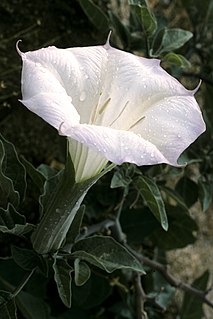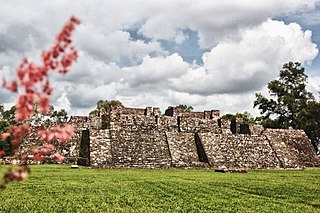
Datura is a genus of nine species of highly poisonous, vespertine-flowering plants belonging to the nightshade family Solanaceae. They are commonly known as thornapples or jimsonweeds, but are also known as devil's trumpets. Other English common names include moonflower, devil's weed, and hell's bells. All species of Datura are extremely poisonous and potentially psychoactive, especially their seeds and flowers, which can cause respiratory depression, arrhythmias, fever, delirium, hallucinations, anticholinergic syndrome, psychosis, and even death if taken internally.

Datura stramonium, known by the common names thorn apple, jimsonweed, devil's snare, or devil's trumpet, is a poisonous flowering plant of the nightshade family Solanaceae. It is a species belonging to the Datura genus and Daturae tribe. Its likely origin was in Central America, and it has been introduced in many world regions. It is an aggressive invasive weed in temperate climates across the world. D. stramonium has frequently been employed in traditional medicine to treat a variety of ailments. It has also been used as a hallucinogen, taken entheogenically to cause intense, sacred or occult visions. It is unlikely ever to become a major drug of abuse owing to effects upon both mind and body frequently perceived as being highly unpleasant, giving rise to a state of profound and long-lasting disorientation or delirium with a potentially fatal outcome. It contains tropane alkaloids which are responsible for the psychoactive effects, and may be severely toxic.

Deliriants are a subclass of hallucinogen. The term was coined in the early 1980s to distinguish these drugs from psychedelics and dissociatives such as LSD and ketamine, respectively, due to their primary effect of causing delirium, as opposed to the more lucid and less disturbed states produced by other types of hallucinogens. The term generally refers to anticholinergic drugs, which are substances that inhibit the function of the neurotransmitter acetylcholine. Common examples of deliriants include plants of the genera Datura and Brugmansia as well as higher than recommended dosages of diphenhydramine (Benadryl). A number of plant deliriants such as that of the Solanaceae family, particularly in the Americas have been used by some indigenous cultures to reach delirious and altered states for traditions or rituals, such as rites of passage, divination or communicating with the ancestors. Despite their long history of use, deliriants are the least-studied class of hallucinogens in terms of their behavioral and neurological effects.

Special Herbs, Vols. 9 & 0 is an instrumental album released by MF Doom under the moniker Metal Fingers. As with all volumes of Special Herbs released by Metal Fingers, each track is named after a herb or similar flora.

Datura metel is a shrub-like annual or short-lived, shrubby perennial, commonly known in Europe as Indian thornapple, Hindu Datura, or metel and in the United States as devil's trumpet or angel's trumpet. Datura metel is naturalised in all the warmer countries of the world. It is found notably in India, where it is known by the ancient, Sanskrit-derived, Hindi name dhatūra (धतूरा), from which the genus name Datura is derived.

The ancient Aztecs employed a variety of entheogenic plants and animals within their society. The various species have been identified through their depiction on murals, vases, and other objects.

Datura innoxia, known as pricklyburr, recurved thorn-apple, downy thorn-apple, Indian-apple, lovache, moonflower, nacazcul, toloatzin, toloaxihuitl, tolguache or toloache, is a species of flowering plant in the family Solanaceae. It is more rarely called sacred datura, a common name which is applied more often to the closely related Datura wrightii. It is native to the Southwestern United States, Central and South America, and introduced in Africa, Asia, Australia and Europe. The scientific name is often cited as D. innoxia. When English botanist Philip Miller first described the species in 1768, he misspelled the Latin word innoxia (inoffensive) when naming it D. inoxia. The name Datura meteloides was for some time erroneously applied to some members of the species, but that name has now been abandoned.
In enzymology, a tropinone reductase I (EC 1.1.1.206) is an enzyme that catalyzes the chemical reaction

Solanoideae is a subfamily of the flowering plant family Solanaceae, and is sister to the subfamily Nicotianoideae. Within Solanaceae, Solanoideae contains some of the most economically important genera and species, such as the tomato, potato, eggplant or aubergine, chili and bell peppers, mandrakes, and jimson weed.

The Serpent and the Rainbow: A Harvard Scientist's Astonishing Journey into the Secret Societies of Haitian Voodoo, Zombies, and Magic is a 1985 book by anthropologist and researcher Wade Davis. He investigated Haitian Vodou and the process of making zombies. He studied ethnobotanical poisons, discovering their use in a reported case of a contemporary zombie, Clairvius Narcisse.

Daidzin is a natural organic compound in the class of phytochemicals known as isoflavones. Daidzin can be found in Japanese plant kudzu and from soybean leaves.

Littorine is a tropane alkaloid found in a variety of plants including Datura and Atropa belladonna. It is closely related in chemical structure to atropine, hyoscyamine, and scopolamine, which all share a common biosynthetic pathway.
Tropine acyltransferase is an enzyme with systematic name acyl-CoA:tropine O-acyltransferase. This enzyme catalyses the following chemical reaction
Pseudotropine acyltransferase is an enzyme with systematic name acyl-CoA:pseudotropine O-acyltransferase. This enzyme catalyses the following chemical reaction

Leucinodes cordalis, the poroporo fruit borer or eggfruit caterpillar, is a species of moth in the family Crambidae. It is found in New Zealand, Australia and Indonesia (Sulawesi). In Australia, it has been reported from Norfolk Island, the Northern Territory, Queensland, New South Wales, the Australian Capital Territory, Victoria, Tasmania and South Australia. The species was first described by Henry Doubleday in 1843.

An O-acylpseudotropine is any derivative of pseudotropine in which the alcohol group is substituted with an acyl group.

Daturadiol is a pentacyclic triterpenoid found in Datura species including Datura stramonium and Datura innoxia. It is also found in non-Solanaceae plants such as Vernicia fordii and Terminalia brasiliensis.

Daturaolone is a triterpene found in Datura species such as Datura stramonium and Datura innoxia.

Methylecgonine is a prominent tropane alkaloid found in coca leaves. It is metabolite of cocaine, and maybe is used as precursor for it. It also occurs as minor alkaloid in roots of many Datura species such as Datura stramonium and Datura innoxia.
















